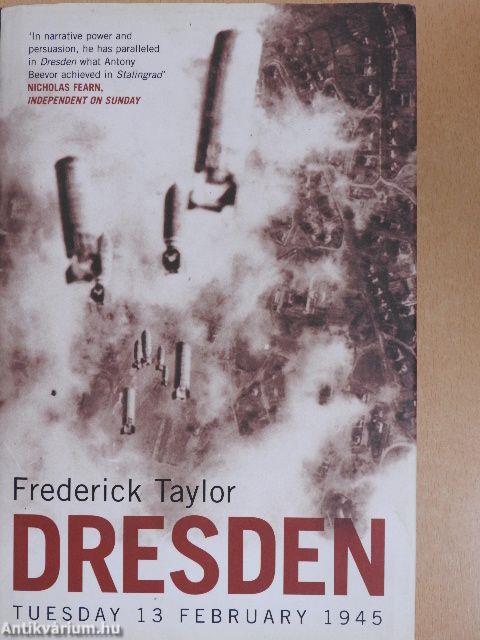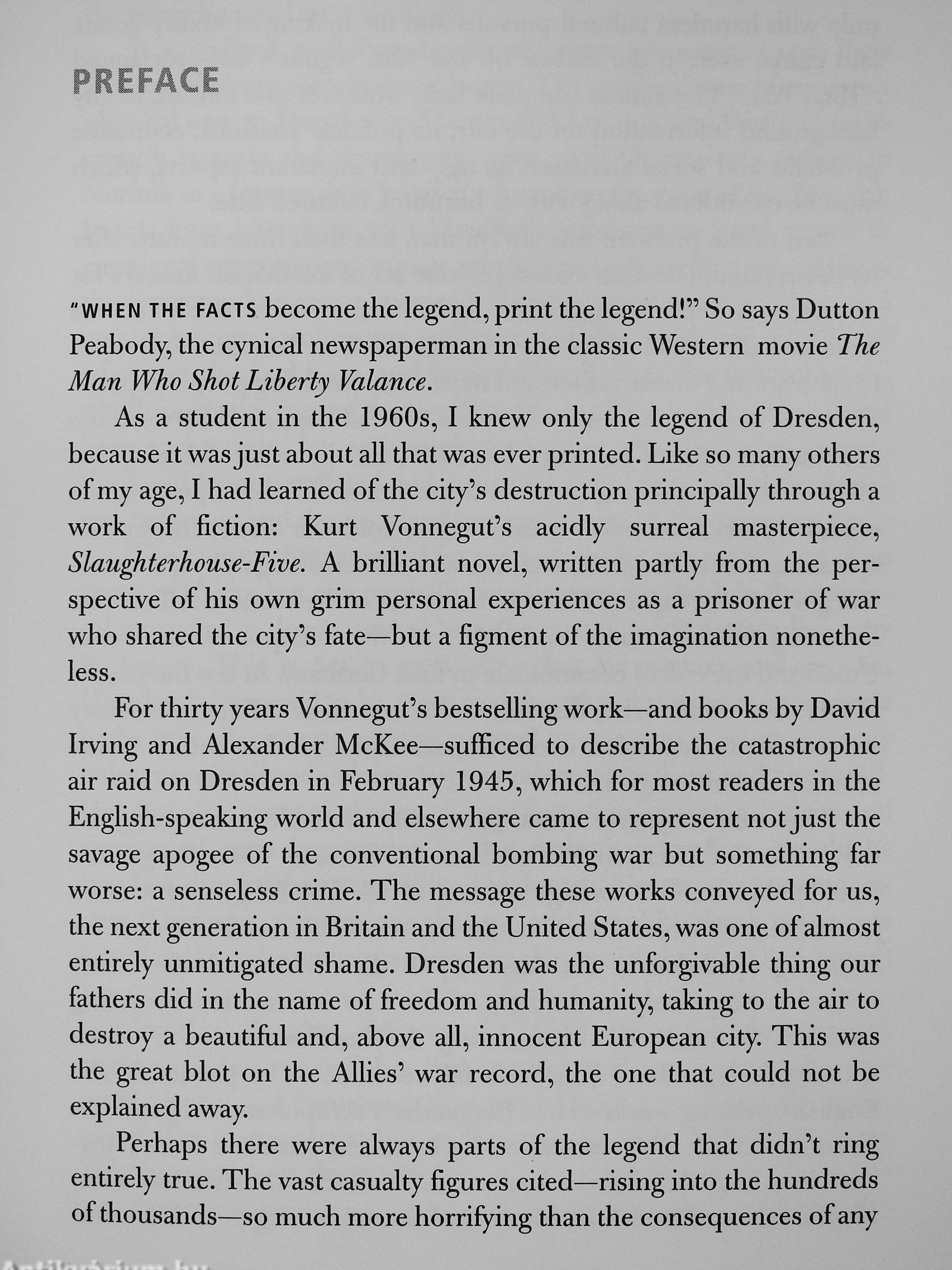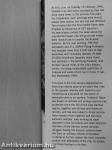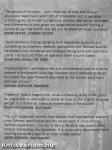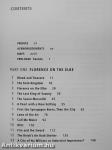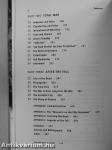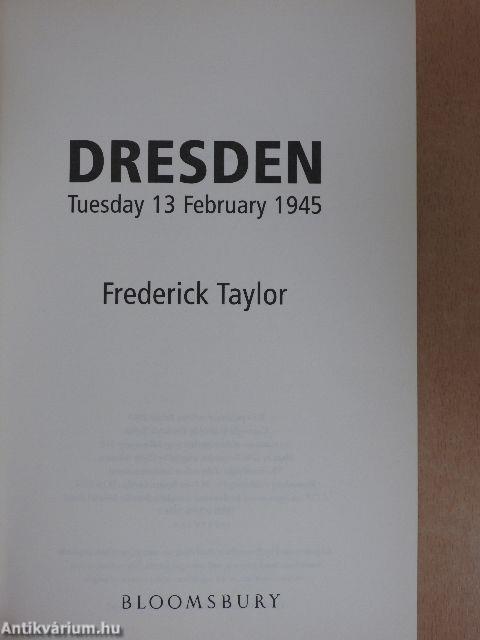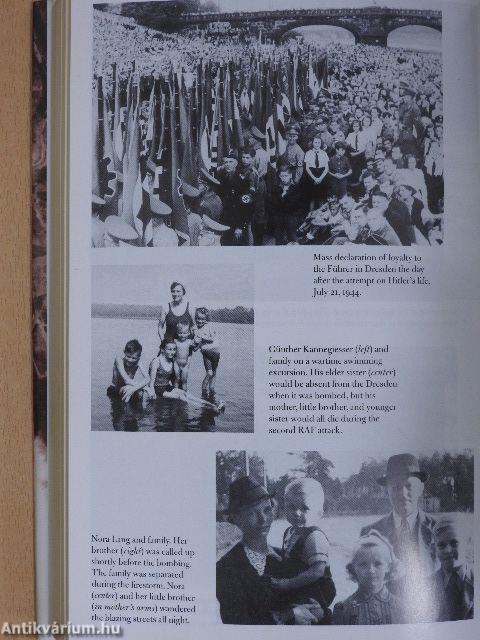1.062.439
kiadvánnyal nyújtjuk Magyarország legnagyobb antikvár könyv-kínálatát

VISSZA
A TETEJÉRE
JAVASLATOKÉszre-
vételek
Dresden
Tuesday 13 February 1945
| Kiadó: | Bloomsbury Publishing Plc. |
|---|---|
| Kiadás helye: | London |
| Kiadás éve: | |
| Kötés típusa: | Fűzött keménykötés |
| Oldalszám: | 519 oldal |
| Sorozatcím: | |
| Kötetszám: | |
| Nyelv: | Angol |
| Méret: | 24 cm x 16 cm |
| ISBN: | 0-7475-7078-7 |
| Megjegyzés: | Fekete-fehér fotókkal. |
naponta értesítjük a beérkező friss
kiadványokról
naponta értesítjük a beérkező friss
kiadványokról
Előszó
TovábbFülszöveg
At 9.51 p.m. on Tuesday 13 February 1945, Dresden's air-raid sirens sounded as tiiey ínad done many times in the previous five years. For Dresdeners, such warnings were almost always false alarms, but this one was different. Ten minutes later the first marker flares were dropped by Mosquitos of 627 squadron. No searchlights probed the skies above the unprotected target city; the guns had mostly been moved East to counter the Russian advance. By the next morning, 796 RAF Lancasters and 311 USAAF Flying Fortresses had dropped more than 4,500 tons of high explosives and incendiary devices. At least 25,000 inhabitants (possibly many more) had perished in the terrifying firestorm, and thirteen square miles of the city's historic centre, including incalculable quantities of treasure and works of art, lay in ruins. It was Ash Wednesday 1945.
This book is the first serious reappraisal for more than twenty years of an event that lives in the popular memory with Guernica and Hiroshima as a... Tovább
Fülszöveg
At 9.51 p.m. on Tuesday 13 February 1945, Dresden's air-raid sirens sounded as tiiey ínad done many times in the previous five years. For Dresdeners, such warnings were almost always false alarms, but this one was different. Ten minutes later the first marker flares were dropped by Mosquitos of 627 squadron. No searchlights probed the skies above the unprotected target city; the guns had mostly been moved East to counter the Russian advance. By the next morning, 796 RAF Lancasters and 311 USAAF Flying Fortresses had dropped more than 4,500 tons of high explosives and incendiary devices. At least 25,000 inhabitants (possibly many more) had perished in the terrifying firestorm, and thirteen square miles of the city's historic centre, including incalculable quantities of treasure and works of art, lay in ruins. It was Ash Wednesday 1945.
This book is the first serious reappraisal for more than twenty years of an event that lives in the popular memory with Guernica and Hiroshima as a by-word for the horror of twentieth-century air warfare. Frederick Taylor has drawn on archives and primary sources only accessible since the fall of the East German regime, together with British and American records, and has also talked to Allied aircrew (now mostly in their eighties) and the city's survivors, whether Jews working as slave labourers in the munitions and radar factories, members of the German armed services, refugees fleeing the Russian advance from the East, or ordinary citizens of Dresden. In doing so he has created the most complete portrait ever attempted of the city, its people, and those involved in its fate.
'The genius of his book, - and I must say at once that it is an absolutely magnificent work both of scholarship and of narration, -is that it gives us enough background, context, description, anecdote and information to help guide our imaginations towards forming a picture of just how horrific the raid and Its aftermath must have been' SIMON HEFFER, LITERARY REVIEW
'Taylor weaves a chilling narrative from eyewitness accounts and painstaking documentary research, particularly with German sources. He explains the conceptual and strategic background with admirable clarity. His account of the air operation itself is'quite superb' ALLAN MALLINSON, THE TIMES
'FrederickTaylor's well-researched and unpretentious book is a robust defence of theDresden raids that counters recent attempts to recast the nation that gave theworld Auschwitz as the second world war's principal victims' MICHAEL BURLEIGH, GUARDIAN
'Frederick Taylor's magnificent, all-encompassing study of the action, its origins and its aftermath is surely as close as the English language will get to a definitive, balanced examination of the subject' ROGER HUTCHINSON, SCOTSMAN
'His cool reappraisal benefits from sources that have become available since German reunification and the recent work of conscientious German researchers he has written a narrative that powers along without descending into hyperbole. It is impeccably documented while avoiding the sterile jargon of so much military history' DAVID CESARANI, INDEPENDENT Vissza
Témakörök
- Idegennyelv > Idegennyelvű könyvek > Angol > Műszaki
- Idegennyelv > Idegennyelvű könyvek > Angol > Helytörténet
- Idegennyelv > Idegennyelvű könyvek > Angol > Történelem > Európa története > Egyéb
- Helytörténet > Helyismeret > Események
- Történelem > Idegennyelvű > Angol
- Történelem > Kontinensek szerint > Európa, európai országok története > Nyugat-Európa > Németország
- Történelem > Legújabb kor > II. világháború > Hadtörténet
- Történelem > Hadtörténet > Háborúk, csaták
- Műszaki > Idegennyelv > Angol
- Műszaki > Hadászat, hadtörténet



